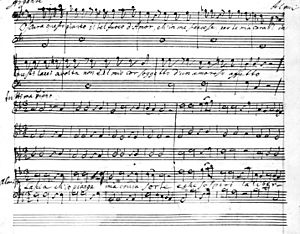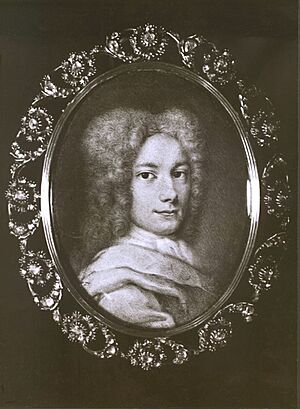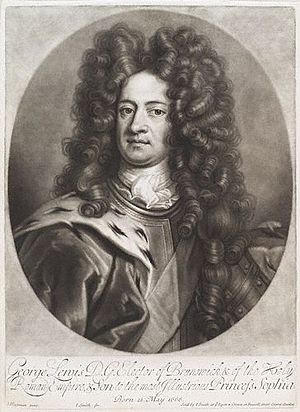Rinaldo (opera) facts for kids
Rinaldo is a famous opera by George Frideric Handel. He wrote it in 1711, and it was the very first Italian language opera made especially for the London stage. The story is about love, war, and finding your way, set during the time of the First Crusade. It's loosely based on a big poem called Gerusalemme liberata by Torquato Tasso.
When Rinaldo first came out, it was a huge hit with the public! People loved its amazing special effects and exciting scenes. Even though some critics didn't like Italian entertainment in English theaters, the opera was a big success.
Handel created Rinaldo very quickly. He used and changed music from other works he had written during his time in Italy (1706–1710), where he became quite famous. Over the years, he made many changes to the music. Today, experts see Rinaldo as one of Handel's best operas. One song, "Lascia ch'io pianga" (meaning "Let me weep"), is especially popular and is often sung in concerts.
Handel became a leading opera composer in England for many years. Rinaldo was performed often in London until 1717, and then again in a new version in 1731. It was Handel's most performed opera during his lifetime. But after 1731, it wasn't staged for over 200 years!
In the 20th century, people became interested in baroque opera again. The first modern show of Rinaldo happened in 1954 in Halle, Germany, where Handel was born. After a very successful run at the Metropolitan Opera in New York in 1984, performances and recordings of Rinaldo became much more common around the world. In 2011, for the opera's 300th birthday, a modern version was performed at the Glyndebourne Festival.
Contents
Handel's Journey to London
Handel started writing operas in Hamburg, Germany, from 1703 to 1706. German opera back then was still developing. It often mixed parts of French and Italian opera with spoken German words. Handel's first opera in this style, Almira, was very successful in 1705.
In 1706, Handel traveled to Italy. He spent a lot of time in cities like Florence, Rome, Naples, and Venice. He visited opera houses and concert halls, meeting famous musicians and singers. In Italy, Handel learned how to write Italian music well. He learned to make the singing sound natural with the Italian words and how to create beautiful melodies.
His first Italian opera, Rodrigo, wasn't a big hit. But his second, Agrippina, was a huge triumph in Venice in 1709. After this, Handel became "world famous" and a favorite of the audience.
Because of his new fame, many people wanted to hire Handel. One of them was Prince Georg Ludwig, who was the Elector of Hanover and would later become King George I of Great Britain. In 1710, Handel accepted a job as a music director for Georg's court in Hanover. This job gave him a lot of freedom to work on his own projects.
Using this freedom, Handel left Hanover for London in late 1710. By 1711, London audiences already knew about Italian opera from other shows. Handel's music wasn't very well known in England yet, but his fame from Agrippina was growing.
In London, Handel got a special job to write an Italian opera for the Queen's Theatre in the Haymarket. This theater was London's main opera house. Its manager, Aaron Hill, wanted to put on the first Italian opera written just for London. He hired an Italian poet, Giacomo Rossi, to write the words (called the libretto). Hill chose the story of Gerusalemme liberata by Torquato Tasso, and the opera was named Rinaldo after its main hero. Hill wanted to use all the theater's special machinery for amazing effects!
Main Characters
| Role | Notes | First Singer (Premiere, 1711) |
|---|---|---|
| Goffredo: leader of the First Crusade | Francesca Vanini-Boschi | |
| Rinaldo: a brave knight | Originally for a high male voice, now often sung by a female contralto or mezzo-soprano, or a male countertenor. | Nicolò Grimaldi ("Nicolini") |
| Almirena: Goffredo's daughter | Isabella Girardeau | |
| Eustazio: Goffredo's brother | This part is sometimes left out in modern shows. | Valentino Urbani ("Valentini") |
| Argante: the Saracen king of Jerusalem | Giuseppe Boschi | |
| Armida: Queen of Damascus, Argante's girlfriend | Elisabetta Pilotti-Schiavonetti | |
| A Christian magician | Giuseppe Cassani |
How the Opera Was Written
Aaron Hill, who wrote the story idea for Rinaldo, said he chose the famous tale of Rinaldo and Armida. However, he changed Tasso's original story quite a bit to make it work for the stage. For example, Hill created a new main female character, Almirena, to be Rinaldo's love interest. The love story between Rinaldo and Armida is not a big part of the opera. Also, the romance between Argante and Armida was Hill's idea.
Giacomo Rossi, the Italian poet, had to turn Hill's story into verses for the songs. Rossi complained that Handel worked so fast! He said, "To my great wonder I saw an entire Opera set to music by that surprising genius, with the greatest degree of perfection, in two weeks."
Handel was able to compose so quickly because he used many songs and other musical pieces from his earlier works in Italy. For example, Almirena's famous song "Lascia ch'io pianga" had appeared in an earlier work called Il trionfo del Tempo e del Disinganno. Some people have questioned if all these borrowed pieces fit perfectly. For instance, a song for Argante about "hissing snakes" might seem a bit odd for a king's grand entrance! But many other songs, about two-thirds of them, were changed and partly rewritten from older music.
Over the years, Handel made many changes to Rinaldo. He often changed parts to fit new singers. For example, in 1717, the role of Eustazio was combined with Goffredo's. In 1731, Handel made even bigger changes. He changed parts of the story and cut many of the special effects and fireworks that were in the original show.
The Music of Rinaldo
Many experts say that Rinaldo is like a "greatest hits" collection of Handel's best music from his time in Italy. The opera's first success was also helped by the amazing singers, especially Nicolini, who sang the main role of Rinaldo.
The music starts with a grand opening piece called an overture. Handel uses brass instruments like trumpets in exciting ways, especially in the march in Act 3, which sounds "splendid and exhilarating." The harpsichord solos in the song "Vo' far guerra" in Act 2 were originally made up by Handel on the spot during performances! People loved them so much that they were written down later.
Even though Handel put the opera together quickly and borrowed music, many believe Rinaldo is one of his greatest operas. It had a very "majestic" orchestra, bigger than any Italian opera heard in London before. The music is described as "varied and excellent."
Musically, Armida is a very strong character. Her first song, "Furie terribili!" (meaning "Terrible Furies!"), shows her fiery passion right away. Rinaldo's song "Cara sposa" (meaning "Dear wife") shows Handel's growing skill in writing beautiful songs. "Or la tromba" is praised for its brilliant use of four trumpets, drums, strings, and oboes – it's the only song Handel ever wrote for this exact mix of instruments!
The most famous song, Almirena's "Lascia ch'io pianga," started as a dance tune in an earlier opera. From this simple melody, Handel creates a very "moving effect."
Images for kids





